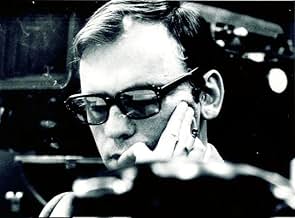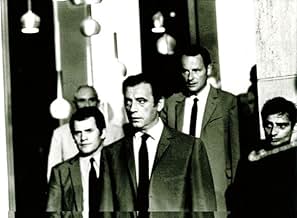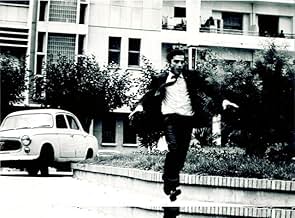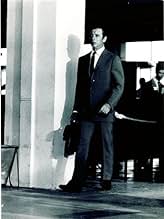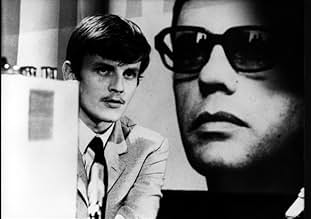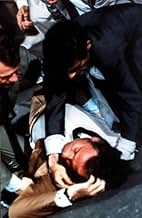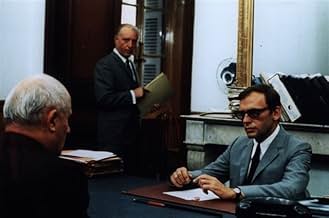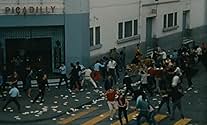Nach dem Mord an einem prominenten Linken versucht ein Ermittler, die Wahrheit aufzudecken, während Regierungsbeamte alles daransetzen, ihre Rolle dabei zu vertuschen.Nach dem Mord an einem prominenten Linken versucht ein Ermittler, die Wahrheit aufzudecken, während Regierungsbeamte alles daransetzen, ihre Rolle dabei zu vertuschen.Nach dem Mord an einem prominenten Linken versucht ein Ermittler, die Wahrheit aufzudecken, während Regierungsbeamte alles daransetzen, ihre Rolle dabei zu vertuschen.
- 2 Oscars gewonnen
- 12 Gewinne & 13 Nominierungen insgesamt
- Hélène
- (as Irène Papas)
- Vago
- (as Marcel Bozzufi)
- Shoula
- (as Clotilde Joanno)
Empfohlene Bewertungen
My rate 8 out of 10
However there are 1-2 things worth mentioning that might interest some folks that are not from Greece: Jean Louis Trintignant's character "The Examining Magistrate" was in reality Christos Sargetakis who became the president of Greece for 5 years(1985-1990).
The film ends with the rise of the military dictatorship and it is suggested that the upposition didn't really capitalise on Lambrakis' assassination.That's not what happened in reality.
In reality the Lambrakis assassination caused the resignation of prime minister Karamanlis(the right wing P.M of Greece at that time) and the triumph of the upposition(something like the democrats in the U.S,the G.Papandreou party,NOT Lambrakis' left wing party) in the elections of 1963 with a whooping 54% which becomes even bigger when taking into account the situation in Greece at that time,with right-wing police controlling everything and manipulating the citizens.
Of course the film was made after the democratic-elected government had fallen and junta had taken over.(in fact the democratic government had fallen 2 years*in 1965* before the junta took over and we had a false semi-democratic government that consisted right wing members of parliament and defected members of the G.Papandreou party)
So in reality the Lambrakis assassination DID make a difference in Greece,if only for 2 years(1963-1965) while on the film nothing changed.I guess with the ultimate rise of the junta that was reigning at the time the film was made it was proper to make the film bleaker than the true events.
While Vassilikos' novel (written in 1966) has driven him to exile from 1967, Theodorakis was still in Greece under surveillance and managed to write his excellent score secretly.
Costa-Gavras gives us a top-class fast paced direction which hasn't aged even today, although I'm sure the Oscar was as much a political decision as a purely artistic one. What is truly spot-on is the casting. Both Montand and Trintignant excel, but even minor roles like Vago and Yago are portrayed in an extremely realistic way. My small objection would be Irene Papas staying near-silent throughout the movie. Although her talent allows her to pull it off with class, I really didn't understand why she was not supposed to talk.
For those who are up to date with Greek history, the country is Greece, the city is Thessaloniki and the politician is Grigoris Lambrakis. But that is of small importance, since this is a story which could have (and possibly has) happened anywhere at any time in history.
About the film: the cinematography is excellent, even by today's standards. The acting and direction are both top class. But what impressed me the most was the film's editing. After the slow first 15-20 minutes or so, the film picks up a pace which is tight and lightning fast. The dialogue is concise and to the point - the film's last lines, spoken by the Narrator and found in the quotes section of IMDb, never fail to bring tears to my eyes. Finally, the film offers what I consider to be the best film score of all time (but I may be a bit biased on this, since the score is by Mikis Theodorakis, my personal favourite).
This kind of documentary-style film making has been done plenty of times since, especially in political thrillers. But this is what sparked everything up. Watch this film. You'll be rewarded.
My rating: 10/10
Wusstest du schon
- WissenswertesThe actor playing the doctor got cold feet during his explanation of the X-rays of Z's cranium. A real doctor, acting as an extra, volunteered to fill in and finished the scene - his only acting performance on film.
- PatzerAfter hitting Z, Vigo and Yago escape on a three-wheeler. Shortly thereafter, the driver Yago is captured by a policeman. The policeman searches him and finds a truncheon. When the guard uses the truncheon on Yago's chest to keep him away, the stick clearly flexes.
- Zitate
Françoise Bonnot, Voiceover Narration: [final lines] The military regime banned: long hair, miniskirts, Sophocles, Tolstoy, Euripides, Russian-style toasts, strikes, Aristophanes, Ionesco, Sartre, Albee, Pinter, freedom of the press, sociology, Beckett, Dostoyevsky, modern music, pop music, new math, and the letter Z, which means HE LIVES in Ancient Greek.
- Crazy CreditsAny resemblance to actual events, to persons living or dead, is not the result of chance. It is DELIBERATE. (Signed by) Jorge Semprún, Costa-Gavras
- VerbindungenFeatured in La solitude du chanteur de fond (1974)
- SoundtracksMesse Pour le Temps Présent--Psyché Rock
(uncredited)
Composed and Performed by Pierre Henry
Courtesy of Philips/PolyGram Records
by arrangement with PolyGram Special Markets
© 1967 Philips Classics Productions
Top-Auswahl
- How long is Z?Powered by Alexa
Details
- Erscheinungsdatum
- Herkunftsländer
- Offizielle Standorte
- Sprachen
- Auch bekannt als
- Z
- Drehorte
- Produktionsfirmen
- Weitere beteiligte Unternehmen bei IMDbPro anzeigen
Box Office
- Bruttoertrag in den USA und Kanada
- 83.305 $
- Eröffnungswochenende in den USA und in Kanada
- 10.144 $
- 15. März 2009
- Weltweiter Bruttoertrag
- 83.305 $
Zu dieser Seite beitragen



